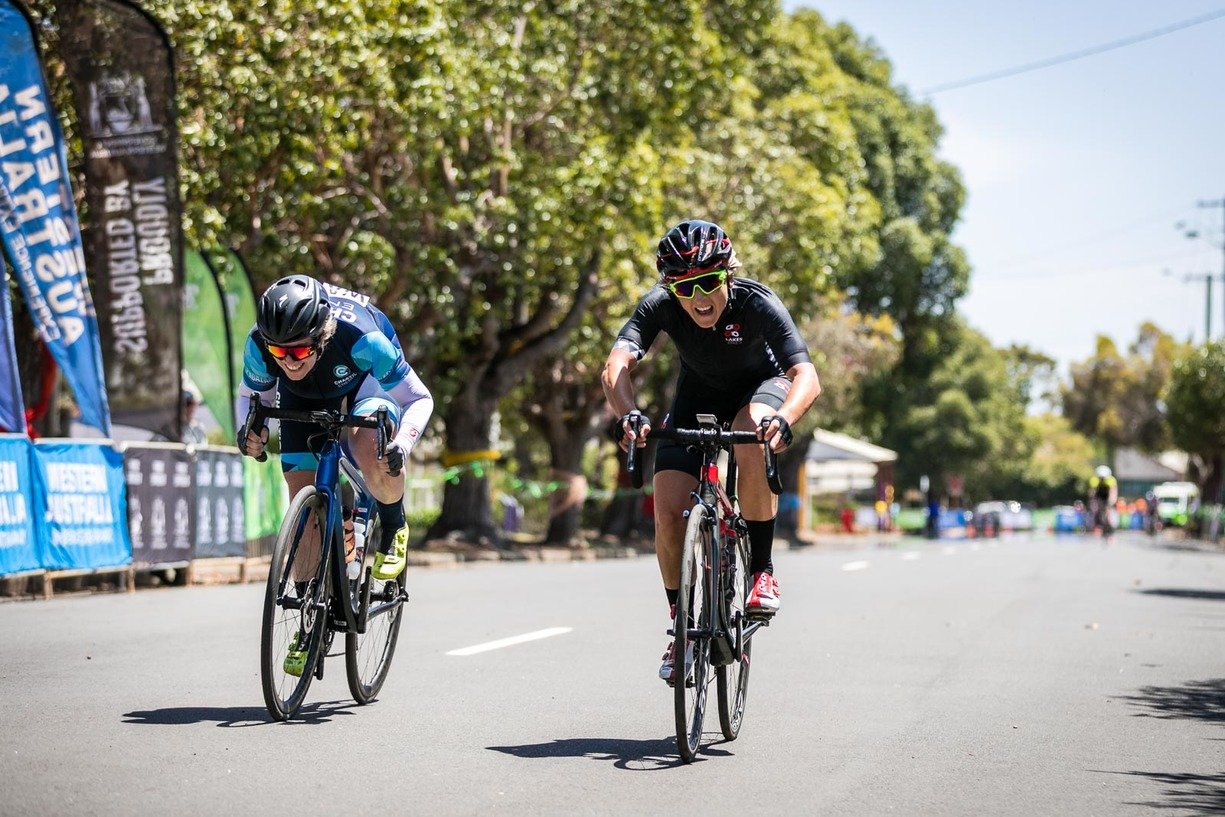Getting results - what informs my coaching approach
Sprinting for my life at Tour of Margaret River!
I’ve been in the ‘business’ of helping athletes achieve their goals for over thirty years. I define an athlete as somebody who engages in physical activity for a specific purpose, whether that to be to compete in a race, achieve an epic goal or in some cases, achieve outcomes in their life that they may not have thought possible due to underlying medical conditions. Personally, there’s no better feeling than seeing the athletes that I coach get results.
While every person I currently coach, or who I’ve coached in the past, has wildly different goals, there are certain principles that inform my coaching approach as a whole. They can loosely be divided into two parts. After a discussion to establish whether we’d be a good fit and after outlying each other’s expectations, we look at the technical and relational aspects of the process.
THE TECHNICAL
“A mind which has once imbibed a taste for scientific enquiry, and has learnt the habit of applying its principles readily to the cases which occur, has within itself an inexhaustable source of pure and exciting contemplations” - John Herschel
This arm of the coaching approach encompasses the following:
Analysis of a detailed questionnaire that details the athlete’s goals, the time they have available to train, equipment available etc. We establish that the goal is achievable in the timeframe that is given and work on the well used adage - S.M.A.R.T - Specific, Measurable, Achievable, Relevant, Time Bound
Using the principles of exercise science, an accurate data set that reflects the athlete’s current physiology is collated.
For cycling and running, data modelling software (WKO5) is used to establish a power duration curve which gives me insight into an athlete’s unique physiology
Establishment of an accurate data set helps me to focus on improving strengths and weaknesses relevant to the event/goal they are pursuing and can help inform the load management aspect of training which is particularly relevant for Masters athletes who are often juggling work commitments and family life on top of their training.
Revision of past data with the athlete’s input into what they felt was going well versus times they struggled with their training can be insightful - often the data will reflect the athlete’s perception of a given training session or event.
Using time parameters such as availability to train and length of time before the event, I will craft a periodised program that addresses the athlete’s strengths and weaknesses, the time they have available to train and importantly, be programmed specifically to the goal they are training for.
THE RELATIONAL
“We make a living by what we get, we make a life by what we give” - Winston Churchill
This side of coaching refers to the coach/athlete relationship which ties the technical aspects of preparing an athlete for an event with personal factors. Getting to know what makes my athletes tick is an important highlight of what I do.
A 2008 study by the Canadian Olympic Team established that the coach/athlete relationship was the most significant contributor to a winning outcome or a personal best in an athletic endeavour. Therefore, it’s important to have this aspect of the process firmly in hand.
A successful coaching relationship entails understanding each other’s expectations, understanding communication style and what environment an athlete trains best in.
A successful coach/athlete relationship requires connection.
Success in the coach/athlete relationship is more than a coach telling the athlete what to do, but rather, walking in partnership with them to get the best bang for buck out of their training.
Success in the coach/athlete relationship also is about developing trust. To that end my coaching approach is informed by, “if something cannot be explained or justified honestly to an athlete, then it is probably not trustworthy.”
COACHING THAT IS BESPOKE FOR AN ATHLETE
I use the technical and relational aspects of coaching to create programs that are completely bespoke to an athlete. Using combinations of modelling data and athlete feedback, the entire program is continuously monitored and adjusted to ensure the best outcomes for the athlete.
To sum up, my coaching approach transcends any stage, or stage you may be in life, for example pregnancy, or through the menopausal transition. You may be preparing for a cycling holiday of a lifetime, or contemplating ticking off a bucket list event like Three Peaks Challenge Falls Creek. You could even be wanting to rip it up in your local crit. All goals are worthwhile, and if you’d like help in achieving them, please get in touch.

